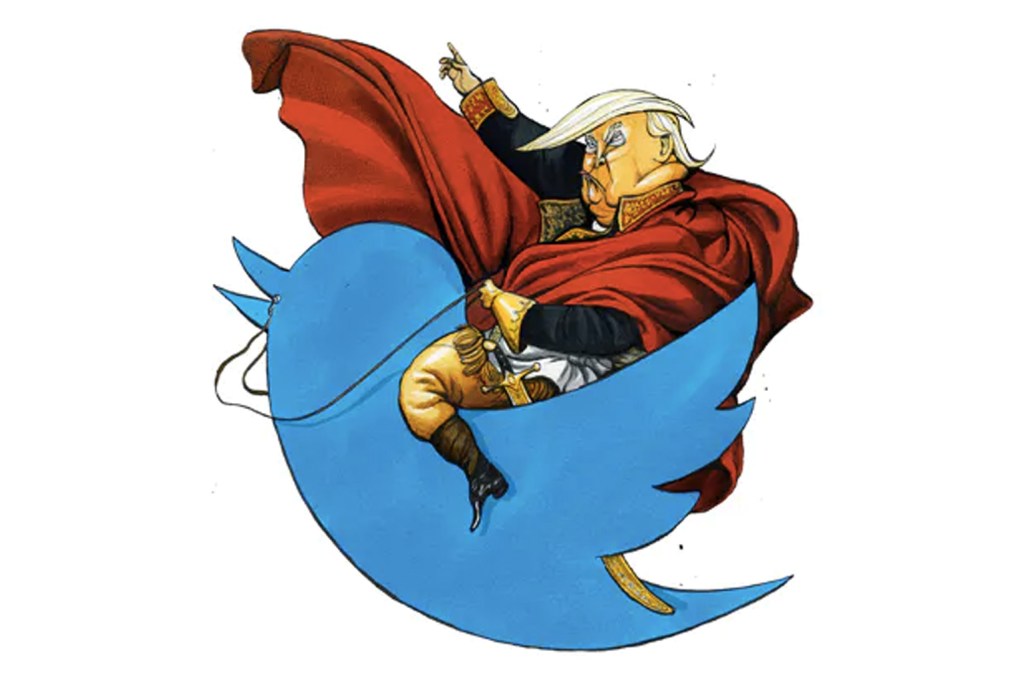This article is in
The Spectator’s November 2019 US edition. Subscribe here.
‘WE WILL FIGHT WHERE IT IS TO OUR BENEFIT, AND ONLY FIGHT TO WIN.’ Thus did America’s Commander-in-Chief at long last enunciate a Trump doctrine, his use of all caps suggesting that this time he really means it.
Trump had run out of patience. ‘I held off this fight for almost 3 years,’ he tweeted on October 7, ‘but it is time for us to get out of these ridiculous Endless Wars… and bring our soldiers home.’ Withdrawing US troops from Syria, a decision he first announced last December but then allowed to lapse, marked a first substantive step toward fulfilling one of the central promises of his 2016 presidential campaign. Yet if the mandarins of the foreign policy establishment have any say in the matter, that promise will retain its place on the long list of things that Trump vowed to do as president but has come nowhere close to accomplishing.
;768:[300×250,336×280,320×100];0:[300×250,320×100,320×50]”]Trump’s latest stab at ending endless wars has elicited from that establishment a horrified response. Here if nowhere else, Democrats and Republicans find common cause. Senate Majority Leader Mitch McConnell, whose deference to Trump is typically somewhere between submissive and supine, spoke for many when he called upon the president to ‘exercise American leadership’. Properly deciphered, McConnell’s message to the Commander-in-Chief means this: ‘You may think our endless wars are ridiculous, but they are also sacrosanct; don’t go messing with them.’
My bet is that McConnell and the bipartisan hosts comprising the stay-the-course chorus will get their way. Time and again, Trump has shown that on matters related to national security he is easily rolled. Out of Nato? Didn’t happen. Putting a stop to European free-riding? Nope. Leaving Afghanistan? Don’t hold your breath. Peace on the Korean Peninsula? Nothing but flamboyant gestures. Theodore Roosevelt once snottily charged William McKinley with having ‘no more backbone than a chocolate éclair’. The insult fits Trump better than it did McKinley even if in Trump’s case the pastry is not only soft but noisome.
Whether or not the president sticks to his guns by pulling US troops out of Syria, the Trump doctrine deserves some serious reflection. Although Trump himself possesses at best a rudimentary familiarity with his country’s history, he is in this instance resuscitating a central tenet of an American military tradition that has recently gone missing.
However infelicitous his phrasing, Trump promises to revive an approach to war to which Ulysses S. Grant and Franklin Roosevelt adhered back when they demanded that their adversaries surrender unconditionally. He is echoing Douglas MacArthur, who famously declared that: ‘There is no substitute for victory.’ He is harkening back to the canonical lessons of Vietnam as articulated by Reagan-era defense secretary Caspar Weinberger who in 1984 insisted that US troops would never again go into battle unless the nation had a ‘clear intention of winning’. He is even doing a fair imitation of George W. Bush, who in announcing the 2003 invasion of Iraq assured his fellow citizens that in the ensuing campaign ‘We will accept no outcome but victory’.
Once upon a time, the American way of war was all about winning. Today it has come to mean something quite different. Once the United States fought wars to end them. Today it seemingly fights wars to perpetuate them.
;768:[300×250,336×280,320×100];0:[300×250,320×100,320×50]”]To his credit, Trump has apparently intuited that there’s something amiss here. For this Commander-in-Chief, any war that drags on and on is by definition a failure.
Yet few members of the present day national security establishment are inclined to see things that way. They have come to accept long wars as tolerable — indeed, to appropriate Sen. McConnell’s phrase, as concrete manifestations of ‘American leadership’. Keeping US forces in Syria, uncomfortably wedged in between Turks, Kurds, the regime of Syrian dictator Bashar al-Assad, and the remnants of Isis, with Russia and Iran lurking in the wings, apparently satisfies this conception of what it means to ‘lead’.
Trump ain’t buying. Having suckered plenty of others during his career as a highflying real estate developer, he knows a bum deal when he sees one. Yet the problem with Trump — OK, one of the many problems — is that he is clueless about how to translate his aversion to endless war into anything akin to a plausible basis for policy. He possesses neither the intellectual capacity nor the attention span needed to devise an approach to ‘American leadership’ that is not centered on the continuous use or threatened use of force. So while Trump’s anti-war instincts have considerable merit, he is incapable of translating instinct into anything remotely approximating an alternative strategy.
The truth of the matter is that ‘American leadership’ badly needs a makeover. The conception that currently prevails in Washington (the Oval Office excepted) rests upon a series of propositions that are no longer operative. Those propositions date from the immediate aftermath of the Cold War when American elites persuaded themselves that the political, military, economic and cultural primacy of the United States was all but assured.
All that was needed to sustain these uniquely favorable circumstances was for the United States to assert itself, thereby demonstrating that no plausible alternative to a US-dominated global order existed. After 9/11, however, that claim crashed and burned, primarily in Iraq, but also in Afghanistan, Libya, Somalia and sundry other locales where the misuse of American military power produced chaos and undermined US credibility on a scale far greater than will result from Trump’s abandonment of the Kurds.
It’s a perplexing argument. Betraying the Kurds (yet again), we are told, will adversely affect the reputation of the United States. Yet how much of that reputation remains, given the way that successive administrations have botched multiple wars, which have together claimed several hundred thousand victims and wasted trillions of dollars? Even today, apart from Trump himself, few figures in Washington are willing to acknowledge the scope of the self-inflicted wounds that the United States has sustained since 9/11.
;768:[300×250,336×280,320×100];0:[300×250,320×100,320×50]”]President Trump is an unlikely source of truth, to put it mildly. But the abject refusal of others in Washington to admit to truths that are readily at hand is an even bigger problem.
This article is in The Spectator’s November 2019 US edition. Subscribe here.

























